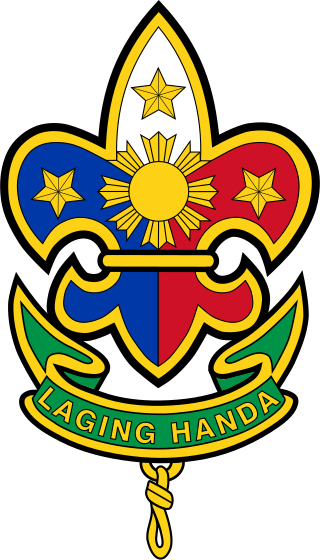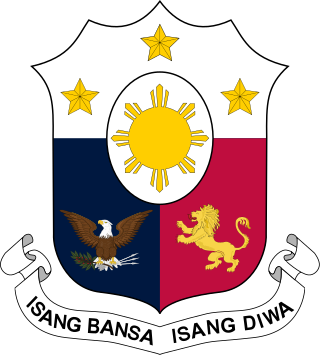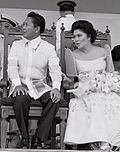Related Research Articles

The Boy Scouts of the Philippines (BSP) is the national scouting organization of the Philippines in the World Organization of the Scout Movement. The Scout movement was first introduced in the Philippines on 1910 during the American Occupation. It was "granted Recognition as a Member Organisation of the Boy Scouts International Conference...with effect from October 31, 1936" by virtue of certification signed by J. S. Wilson, Olave Baden-Powell, and Daniel Spry.

Filipino nationalism refers to the establishment and support of a political identity associated with the modern nation-state of the Philippines, leading to a wide-ranging campaign for political, social, and economic freedom in the Philippines. This gradually emerged from various political and armed movements throughout most of the Spanish East Indies—but which has long been fragmented and inconsistent with contemporary definitions of such nationalism—as a consequence of more than three centuries of Spanish rule. These movements are characterized by the upsurge of anti-colonialist sentiments and ideals which peaked in the late 19th century led mostly by the ilustrado or landed, educated elites, whether peninsulares, insulares, or native (Indio). This served as the backbone of the first nationalist revolution in Asia, the Philippine Revolution of 1896. The modern concept would later be fully actualized upon the inception of a Philippine state with its contemporary borders after being granted independence by the United States by the 1946 Treaty of Manila.

DWGT-TV is a television station in Metro Manila, Philippines, serving as the flagship of the government-owned People's Television Network. The station maintains studios and hybrid analog/digital transmitting facility at Broadcast Complex, Visayas Avenue, Brgy. Vasra, Diliman, Quezon City.

Ricardo Arreola Lee is a Filipino screenwriter, journalist, novelist, and playwright. He was conferred the Order of National Artists of the Philippines for Film and Broadcast Arts in 2022.

Jose Maria Flores Lacaba, also known as Pete Lacaba, is a Filipino screenwriter, editor, poet, journalist, activist and translator.

Juan Ariel Muñoz Ureta is a Filipino comedian, actor and TV host.

Isang Bansa, Isang Diwa was the national motto of the Philippines from 1978 to 1986, during the presidency of President Ferdinand Marcos. It was adopted on June 9, 1978 by virtue of Presidential Decree No. 1413. The motto has been criticized and has been denounced as "the slogan of a fascist regime".

The Bantayog ng mga Bayani, sometimes simply referred to as the Bantayog, is a monument, museum, and historical research center in Quezon City, Philippines, which honors the martyrs and heroes of the struggle against the dictatorship of 10th President Ferdinand Marcos.
Student activism in the Philippines from 1965 to 1972 played a key role in the events which led to Ferdinand Marcos' declaration of Martial Law in 1972, and the Marcos regime's eventual downfall during the events of the People Power Revolution of 1986.
Liliosa Rapi Hilao was a Filipina student activist who was killed while under government detention during Martial Law in the Philippines, and is remembered as the first prisoner to die in detention during martial law in the Philippines. She was a student of Communication Arts at the Pamantasan ng Lungsod ng Maynila.

Proclamation No. 216 was the 2017 proclamation of martial law and suspension of the privilege of the writ of habeas corpus in the whole of Mindanao amid clashes between government forces and Maute group terrorists in Marawi, issued by Philippine President Rodrigo Duterte on May 23, 2017. The state of martial law was extended thrice by Congress at the request of Duterte, citing necessity to quell hostile activities perpetrated by terrorist groups, and ended with the third extension lapsing on December 31, 2019.

Protests against Former President Rodrigo Duterte escalated on November 18, 2016, following Duterte's support of the burial of the late president Ferdinand Marcos. These series of protests are mostly conducted by progressive groups and other opposing figures mainly due to the ongoing war on drugs, the declaration of martial law in Mindanao, and employment issues such as contractual terms being applied by companies and inflation which occurred due to the passage of the Tax Reform for Acceleration and Inclusion Law. Other causes of the protests include the government's response to the COVID-19 pandemic in the country, the passage of the Anti-Terrorism Act of 2020, and the shutdown and franchise denial of ABS-CBN.

The following is a timeline of protests against Rodrigo Duterte, the 16th President of the Philippines, and his policies. Issues were addressed in the protests including the war on drugs, employment issues, anti-terror law, and the government's response to the COVID-19 pandemic.
The Southern Tagalog 10 was a group of activists abducted and "disappeared" in 1977 during martial law in the Philippines under Proclamation No. 1081 issued by President Ferdinand E. Marcos. Of the 10 university students and professors who were abducted, only three, Virgilio Silva, Salvador Panganiban, and Modesto Sison, "surfaced" later after being killed by suspected agents of the state. Two of those who surfaced were apparently summarily executed. The rest were never found.

At 7:15 p.m. on September 23, 1972, President Ferdinand Marcos announced on television that he had placed the Philippines under martial law, stating he had done so in response to the "communist threat" posed by the newly founded Communist Party of the Philippines (CPP), and the sectarian "rebellion" of the Muslim Independence Movement (MIM). Opposition figures of the time accused Marcos of exaggerating these threats and using them as an excuse to consolidate power and extend his tenure beyond the two presidential terms allowed by the 1935 constitution. Marcos' signed Proclamation No. 1081 on September 21, 1972, marking the beginning of a fourteen-year period of one-man rule which effectively lasted until Marcos was exiled from the country on February 25, 1986. Proclamation No. 1081 was formally lifted on January 17, 1981, although Marcos retained essentially all of his powers as dictator until he was ousted in February 1986.
Alexander "Alex" Orcullo was a Filipino journalist, community leader, and activist known for speaking against the abuses of the dictatorship of Ferdinand Marcos, and for being a seminal figure of the protest movement against the Marcos dictatorship in Mindanao, Philippines.
Captain Danilo Poblete Vizmanos, PN, Ret. was a Filipino activist and retired captain of the Philippine Navy. He is best known for his resistance against the Martial Law regime of former Philippine President Ferdinand Marcos. On November 30, 2016, Vizmanos' name was engraved on the Wall of Remembrance of the Bantayog ng mga Bayani, which honors the martyrs and heroes who fought against the Marcos dictatorship.
Ferdinand Marcos developed a cult of personality as a way of remaining President of the Philippines for 20 years, in a way that political scientists have compared to other authoritarian and totalitarian leaders such as Joseph Stalin and Adolf Hitler, but also to more contemporary dictators such as Suharto in Indonesia, Saddam Hussein in Iraq, and the Kim dynasty of North Korea.
The Student Christian Movement of the Philippines (SCMP) is a youth ecumenical national democratic mass organization in the Philippines. It aims to uphold students rights and participates in numerous local and worldwide peoples' advocacies. As with other SCMs around the world, SCMP is a member of the World Student Christian Federation. In the Philippines, it is an associate member of the National Council of Churches in the Philippines (NCCP) and Kalipunan ng Kristiyanong Kabataan sa Pilipinas (KKKP). It is also a member and a founding organization of Kabataan Partylist.
The different forms and trends of protest music against the Marcos dictatorship mostly first became prominent during the period now known as the First Quarter Storm, and continued until Ferdinand Marcos was deposed during the 1986 People Power revolution; some of the trends continued beyond this period either in commemoration of the struggle against the Marcos dictatorship, or in opposition to the political return of the Marcos family to a prominent place in Philippine politics.
References
- ↑ Watson, T. (2014). Asian perspectives on the development of public relations : other voices. Basingstoke: Palgrave Macmillan. ISBN 9781137398154. OCLC 880969261.
- ↑ Lakas Sambayanan on YouTube
- 1 2 3 Brillantes, Alex B. (1987). Dictatorship & martial law: Philippine Authoritarianism in 1972. Quezon City, Philippines: University of the Philippines College of Public Administration and Great Books Publishers. ISBN 9718567011. OCLC 18045976.
- ↑ Beltran, JC A.; Chingkaw, Sean S. (2016-10-20). "On the shadows of tyranny". The GUIDON. Retrieved 2018-07-21.
- ↑ "Ariel Ureta says the "Sa ikauunlad ng Bayan, bisikleta ang kailangan" story about him is an urban legend". PEP.ph. Retrieved 2022-05-30.
